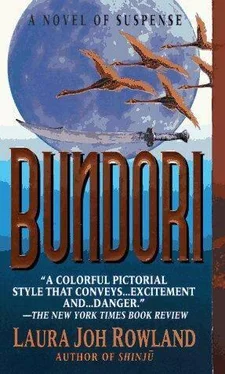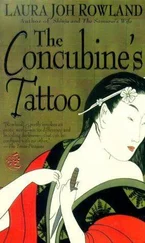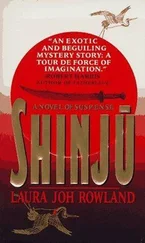The chamberlain flew backward, slamming up against the cabin door. “Please, Chūgo,” he begged. Crumpling to the floor, he twisted in a futile attempt to free his hands and feet. Blood and saliva spattered from his mouth as he pleaded, “I’ll make you a rich man. I’ll promote you to chief of defense. Anything. Just have mercy!”
But Yanagisawa’s status, power, and hostage value no longer mattered to Chūgo. Now he saw Yanagisawa as a symbol of all he hated-of today’s weak, corrupt samurai, so inferior to past heros. A kinsman who had failed to venerate their ancestor as he did. A representative of the Tokugawa, who’d reaped the benefits of treachery, and were therefore just as responsible for Oda’s murder as Akechi Mitsuhide, Araki Yojiemon, and Endō Munetsugu.
Chūgo backhanded a blow across Yanagisawa’s mouth. Then he hit on a truly fitting punishment for the chamberlain, who so deserved a taste of his own evil.
Chūgo threw Yanagisawa facedown on the floor. He lifted the chamberlain’s outer robes and yanked down his voluminous trousers. He tore away the loincloth whose band cleaved the naked buttocks. Then he hiked up his own kimono, loosened his loincloth, and rubbed his organ until it hardened. He straddled Yanagisawa and entered him with a brutal thrust.
“No, master!” screamed Yanagisawa. His body bucked; the fingers of his bound hands clawed the air. “Please!”
Five quick strokes, and Chūgo spurted. He felt potent, powerful; but physical satisfaction wasn’t enough. He craved the ultimate release that slaying his ancestor’s enemies always brought. Deep inside, he knew there was every chance that he would be captured. Killing the chamberlain might be his last chance for revenge.
“Please, have mercy,” Yanagisawa blubbered. “Please!”
Rising, Chūgo straightened his garments. He threw the door open. Rain and wind blasted into the cabin. He dragged Yanagisawa onto the deck. He would have to live in the cabin for days or months while he sought a safe harbor, and didn’t want to contaminate it with his enemy’s death.
“No!” screamed Yanagisawa.
Dragging the chamberlain with him, Chūgo splashed through the ankle-deep water on the starboard deck. A jagged lightning streak seared his eyes; the simultaneous thunderclap shook the sky. The boat rolled. Spreading his legs to balance himself, Chūgo positioned Yanagisawa against the railing, head and shoulders hanging over the water.
“No, please, no!”
The sweet flame of anticipated victory leapt inside Chūgo. The thunder rumbled like war drums; the lightning blazed like a burning castle. The rain became soldiers’ chants; the wind, the blaring of conch trumpets. Chūgo saw himself riding into battle, and presenting a new trophy to Lord Oda. Pinning the chamberlain still ›with his body, he grabbed Yanagisawa’s hair and yanked his back, exposing his throat. He drew his short sword.
Still clinging to the railing, Sano looked into the stern. Dread clutched his heart when he found it empty. Why wasn’t Chūgo manning the sail’s lines? Had he jumped overboard, leaving Yanagisawa to die? Then Sano heard hysterical screams coming from the starboard deck.
“No, master, spare me, I beg you!”
Sano hauled himself aboard the boat and collapsed on the waterlogged deck, where he fought to catch his breath and regain his strength. His chilled body shivered violently in the cold wind, and when he tried to rise, he fell twice before he gained his feet. Then, leaning against the cabin wall, he lurched toward the sound of Yanagisawa’s voice.
Horror energized him when he saw Chūgo holding the chamberlain over the railing, blade to his throat. Sano drew his own sword. Though he wanted to take Chūgo alive, he would kill to save Yanagisawa.
“Chūgo!” he shouted above the wind and rain and the chamberlain’s pleas. He lunged at the guard captain.
The chamberlain kept screaming. Chūgo’s head snapped around. His eyes were fierce slits, his mouth a snarl like that of an armor mask. Sano raised his sword in both hands, but before he could bring it slashing downward across Chūgo’s face and shoulder, the boat rocked. Sano lost his footing and stumbled sideways. The movement threw Chūgo and Yanagisawa free of the railing. The guard captain let his prisoner fall to the deck. In a motion so fast that Sano didn’t see it, he sheathed his short sword and drew the long one. He rushed at Sano, slashing and thrusting.
Sano regained his balance, sidestepped and parried, but too late. Chūgo’s blade sliced his left upper arm. A gush of blood warmed his cold skin. Darting backward just in time to avoid a cut to his neck, he launched an offensive, but his reflexes were dangerously slow. Spiritual energy couldn’t entirely compensate for an exhausted body. Chūgo effortlessly parried every cut, inserting thrusts between each, driving Sano backward into the stern. The boat swayed as it careened downstream, hurling Sano at Chūgo. Ever more unsure that he could defeat the guard captain, Sano tried to reason with him.
“Give up, Chūgo,” he urged between gasps. “Even if you kill me, you won’t get away. Especially if you harm the chamberlain. The army will hunt you down. And without a hostage, they’ll have no reason to spare your life.”
Chūgo dealt a low cut that sliced Sano’s calf. Sano’s instinctive jump saved his leg from mortal damage, but his despair increased because he’d easily recognized Chūgo’s maneuver as one he’d faced during practice sessions, yet had been too weak to react soon enough. He had only his wits to use against the madman’s superior strength.
Chūgo’s assault propelled him around the port deck and into the bow. Still parrying frantically, Sano circled the foredeck, noting how, as the boat tipped, the sail swung back and forth in an arc. With a sideways leap that strained his bursting lungs, Sano forced Chūgo to pivot and fight with his back to the sail. Sano lashed out at Chūgo and took a cut to his shoulder. Dodging, he tripped over the anchor. Then the wind whipped the sail around. The boom whacked Chūgo across the back; he stumbled. Sano sliced at Chūgo’s sword hand. The tilting boat knocked him off balance again, and the blade only grazed Chūgo’s knuckles, but the captain dropped his sword. Sano lunged at Chūgo. Then the boat lurched, throwing him backward.
Sano’s feet skidded on the flooded deck. His arms instinctively shot out. As he hit the cabin, Chūgo was upon him, one hand gripping his throat, the other clamped around his wrist, immobilizing his sword. The boat rocked again. Together he and Chūgo pitched forward. Now Chūgo, in a deft maneuver, reversed their positions. Sano reeled backward, past the swinging sail, and into the bow. His back struck the railing as he grappled with Chūgo. The guard captain increased the pressure on his throat, bending his head back.
Sano coughed, struggling with his left hand to break Chūgo’s hold, and with his right to free his sword. Back, back, he arched over the railing. Faintly, he heard Yanagisawa’s screams. Rain filled his gaping mouth, splattered his eyes. Above him he saw the stormy sky, then a soaring arch of crossed and parallel wooden beams. They were passing beneath the Ryōgoku Bridge. Sano couldn’t resist Chūgo any longer. His feet left the deck-
With a sudden, shuddering crash from the port side that Sano initially took for thunder, the boat stopped. He barely had time to register that it had struck one of the bridge’s supports. Their forward momentum carried him and Chūgo over the railing. They were falling…
The resultant splash jarred Sano’s bones. He gasped and gurgled when the cold water closed over his head. Kicking and thrashing, he tried to raise himself above the surface, but Chūgo kept hold of his wrist, twisting it. Pain shot through his arm; he let go the sword. Then Chūgo clasped both hands around his throat, throttling him, holding his head underwater.
Читать дальше












